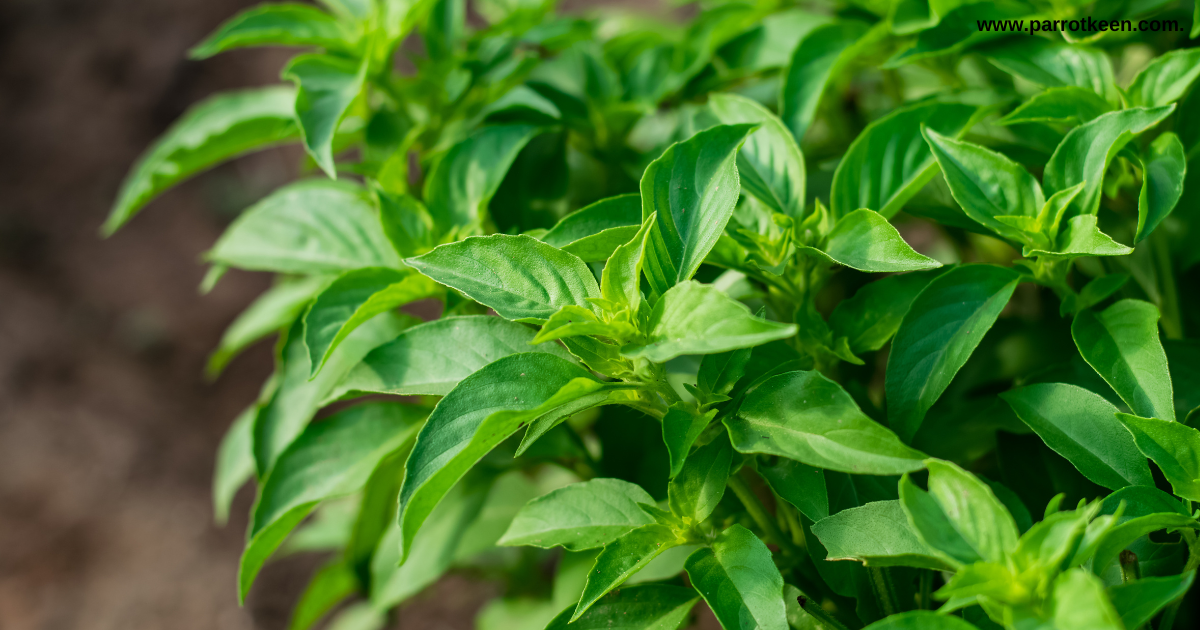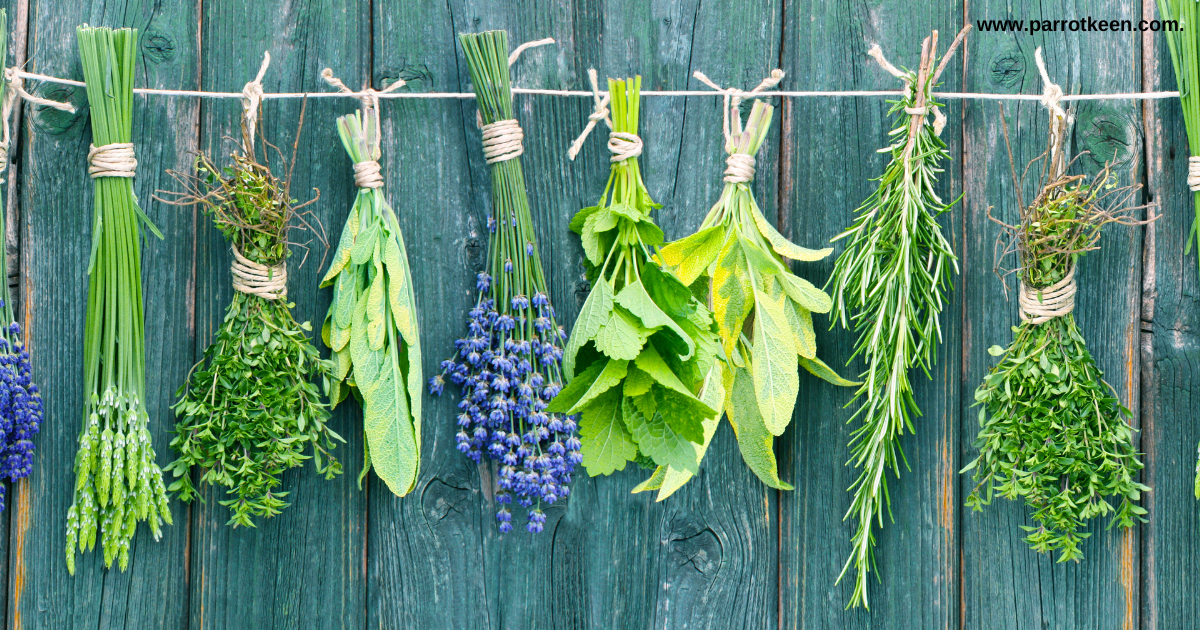![Can Budgies Eat Basil?[Answered]](https://parrotkeen.com/wp-content/uploads/2022/08/Can-Budgies-Eat-Basil.jpg)
Can Budgies Eat Basil?
If you’re like me, you probably love growing your herbs. There’s nothing quite like picking a few fresh basil leaves from your garden and adding them to a dish for flavor. There are lots of herbs out there that your cute budgie can eat safely, But can budgies eat basil?
The answer may surprise you! In this blog post, we will discuss the nutritional value of basil for budgies and how to incorporate it into their diet safely.
About Basil (Ocimum basilicum)

Basil is a tropical plant best known for its role in Italian cuisine. The leaves of the basil plant are used to add flavor to a variety of dishes, and the plant itself is relatively easy to grow.
Basil prefers warm weather and sunlight, so it is often grown outdoors in the summer. However, basil can also be grown indoors year-round if given enough light. When watering basil, keep the soil moist but not soggy, as too much water can damage the roots.
With some care, basil can provide delicious flavor to your cooking all year. However, can budgies eat it?
Can Budgies Eat Basil?
Yes, budgies can eat basil. In moderation, basil can be a great addition to your budgie’s diet. Basil is a good source of vitamins A and k, calcium, iron, and magnesium. It also contains several antioxidants that can help to protect your budgie’s cells from damage.
When feeding basil to your budgie, start with just a small amount. You can offer fresh basil leaves or dried basil flakes. If you’re giving your budgie dried basil, make sure it’s unsalted and unflavored.
As always, monitor your budgie closely when introducing new foods to their diet. If they seem uninterested in the basil or have any adverse reaction, discontinue use and consult your veterinarian.
However, if they enjoy it and don’t have any problems, feel free to add a little more basil to their diet. Your budgie will love the taste – and you’ll love knowing that they’re getting some extra vitamins and minerals!
Health Benefits (Nutritional Value) of Basil to Budgies
Basil is a popular culinary herb, but did you know it can also benefit your feathered friends? Budgies are especially fond of the taste of basil, which can provide them with several health benefits. Basil is a good source of:
-
Vitamin C
Vitamin C is an essential nutrient for budgies, as it helps to boost the immune system and promote healthy skin and feathers. If you’re looking for a way to add some extra nutrition to your budgie’s diet, try adding a few basils leaves to their food. Your feathered friend will thank you!
-
Antioxidants
Basil also contains antioxidants, nutrients that help protect cells from damage. In budgies, antioxidants can help to prevent age-related health problems such as cataracts and arthritis.
-
Digestive Health
Basil can also be helpful for digestive problems. Its mild laxative effect can help to keep the digestive system running smoothly and prevent constipation. Including basil in your budgie’s diet is a simple way to help them stay healthy and comfortable.
-
Iron
Basil is an excellent source of iron, which is essential for budgies. Iron helps transport oxygen around the body and is necessary for producing hemoglobin, the protein that gives blood its red color.
A lack of iron can lead to anemia, which can cause lethargy and weakness. Therefore, adding basil to your budgie’s diet can help to keep them healthy and active.
-
Vitamin B6
Vitamin B6, also called pyridoxine, is vital for metabolizing carbohydrates and fats. It is also needed to synthesize nucleic acids (DNA and RNA) and produce red blood cells.
Basil is a good source of vitamin B6, providing 11% of the Daily Value in just one tablespoon (6 grams). This makes it an important food for budgies, which require a lot of energy to stay active.
-
Manganese
Manganese is a mineral that is involved in several important processes in the body, including energy production, bone formation, and wound healing. Basil is a good source of manganese, providing 7% of the Daily Value in just one tablespoon (6 grams).
This makes it an important food for budgies, which require a lot of energy to stay active. Additionally, manganese is necessary for proper bone development, so it helps to keep budgies healthy and strong.
-
Calcium
Basil is a good source of calcium, providing 5% of the Daily Value in just one tablespoon (6 grams). This makes it an important food for budgies, which require a lot of calcium for proper bone development.
Additionally, calcium is necessary for proper nerve function and muscle contraction, so it helps to keep budgies healthy and active.
-
Potassium
Potassium is an essential mineral that helps to maintain fluid balance in the body and supports healthy nerve and muscle function. In addition, potassium can help to lower blood pressure by reducing the effects of sodium. As a result, adding basil to your budgie’s diet can help to promote their overall health.
-
Dietary fiber
Dietary fiber is a crucial component of a healthy diet, and basil is a good source of this nutrient. Basil contains both soluble and insoluble fiber, which can help to regulate digestion and prevent constipation.
In addition, dietary fiber has been shown to reduce cholesterol levels and protect against heart disease. As a result, feeding your budgie a small amount of basil daily can help keep them healthy and disease-free.
Possible Side Effects of Feeding Basil to Budgies
Some pet owners choose to feed their animals herbs in addition to their regular diet, and basil is a popular choice for budgies. While this herb can provide some health benefits, there are also some potential side effects to be aware of:
-
Chemical residue effect
When feeding your budgie fresh basil, it is important to wash the leaves thoroughly to remove any chemical residues that may be present. Chemical residues can build up in the body and potentially cause health problems.
-
Allergies
Some budgies may be allergic to basil and may experience symptoms such as itchiness, redness, swelling, or difficulty breathing. If you notice any of these symptoms in your budgie after feeding them basil, stop feeding them the herb and consult a veterinarian.
-
Diarrhea
Basil can also cause diarrhea in budgies. If your budgie eats too much of the herb, they may have loose stools or watery poop. Diarrhea can lead to dehydration, so it’s important to ensure your budgie has access to fresh water if they’ve been eating basil.
See a vet if your budgie continues to have diarrhea after stopping basil or if they seem lethargic or unwell.
-
Upset Stomach
Some budgies may experience an upset stomach after eating basil due to the essential oils in the herb. If your budgie eats basil and then vomits or has a bellyache, stop feeding them the herb.
An upset stomach is usually not serious and will resolve on its own, but if your budgie seems uncomfortable or has other symptoms, see a vet.
Do Budgies Like Basil?
If you have a budgie, you may have considered planting a basil plant to see if your feathered friend will enjoy nibbling on the leaves. While every parrot is different, and there’s no guarantee that your parrot will like basil, it’s definitely worth a try!
Some parrots enjoy the taste of basil, while others are not so fond of it. If you decide to try basil, be sure to monitor your parrot closely at first to ensure that they are not overeating.
With a little trial and error, you’ll soon find out whether or not your parrot enjoys the taste of this popular herb.
How to prepare basil for budgies
If you would like to offer your budgie some basil, you should know a few things.
- Firstly, choosing organic basil that has not been treated with chemicals or pesticides is important.
- Secondly, the basil should be washed thoroughly to remove any dirt or debris.
- Finally, the leaves should be chopped into small pieces before being given to your budgie.
You can add it to any meal or offer it as a treat. You can add chopped basil to bird bread or pasta dishes for meals. You can mix chopped basil with other healthy foods such as fruits or vegetables for treats.
If you’re unsure how your budgie will react to basil, start by offering a small amount and then increase the amount gradually over time.
Can Budgies Eat Raw Basil?
The answer is yes! Basil is a safe treat for budgies and can provide them with some important nutrients. Raw basil leaves are a good source of nutrients. Raw or uncooked basil is the best way to give your budgie the nutrients from the herb.
Can Budgies Eat Basil Seeds?
No, although there are no harmful effects or toxicity found in basil seeds, a small minority of birds may be allergic to them. If you are unsure whether your bird can eat basil seeds, it is always best to consult with a veterinarian first.
Can Budgies Eat Thai Basil?
Yes, budgies can eat Thai basil, which has a licorice flavor. Thai basil is an excellent source of vitamins A and C, calcium, and iron. It’s also a good way to add variety to your budgie’s diet. Like all herbs, Thai basil should be given in moderation.
Can Budgies Eat Basil Flowers?
Yes, budgies can eat basil flowers. There is no need to pluck out the flowers before giving them to your budgie, as the entire plant is safe for your feathered friend to consume. As long as you offer only a small amount of basil flowers to your budgie at a time, they can be a healthy part of your pet’s diet.
Healthy Herbs & Plants that Budgies Can Eat (Non-toxic)

Just as we need a balanced diet to stay healthy, so do our feathered friends. A diet consisting mainly of seeds may provide all the nutrients your budgie needs to survive. Still, it is lacking in many other important vitamins and minerals.
To ensure your budgie lives a long and healthy life, it is important to supplement its diet with fresh fruits, vegetables, and herbs.
While there are many safe options to choose from, some of the best choices for budgies include beans, carrots, broccoli, spinach, cabbages, and Asian greens.
When it comes to herbs, mint, parsley, rocket, and basil are excellent options. Not only do they add a pop of color to your budgie’s diet, but they also contain many essential nutrients.
Finally, dandelions and seeding grasses make great weeds for your bird to munch on. Not only are they packed with nutrition, but they also help to keep your budgie’s beak in good condition.
Conclusion: Can Budgies Eat Basil?
As you can see, there are several plants that budgies can and cannot eat. If you are unsure whether or not a plant is safe for your bird, it is best to avoid giving it to them altogether. With a little research, you can create a healthy and nutritious diet for your pet budgie.
Please share this article with other budgie owners if you find it helpful. And if you have any questions, feel free to leave a comment below.

Hi, I am Thersa and Welcome to ParrotKeen, your number one place to get all the information you need about your cute parrot. I hope You Find it useful.
